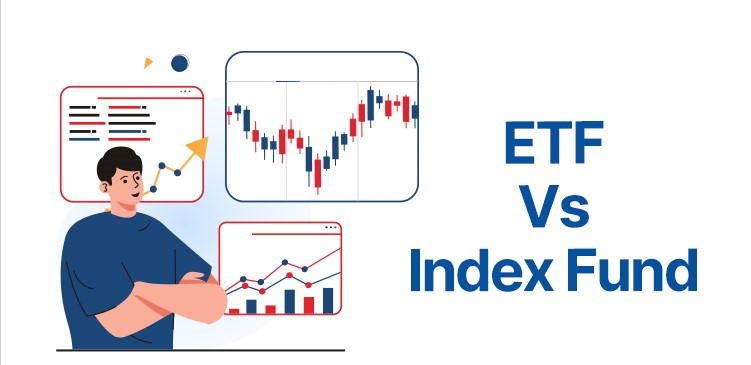Written by
Updated :
Reviewed by
Index Funds and exchange traded funds (ETFs) are common examples of investments where fund managers replicate a certain benchmark index in terms of the investment portfolio with the intent of mirroring benchmark returns. This style of investing which does not involve active stock picking or actively buying and selling ETFs is termed as passive investing. While both ETFs and index funds belong to the same passive investment category, there are significant differences between them.
In this article, we shall have a detailed discussion on differences between Index Funds vs ETFs to help you decide which investment option is better suited to your needs.
What are Index Funds and ETFs?
Index funds are passive mutual funds in which the fund managers replicate a certain benchmark index like NIFTY 50 or SENSEX. Managers build a portfolio of securities that mirror these indices. One of the biggest advantages of investing in index funds is the potential for diversification. This holds true whether the index mutual fund mirrors a broad-based index like the Nifty 50 Index or a strategy index like the Nifty Smallcap 250 Quality 50 Index.
Exchange Traded funds or ETFs are a popular passive investment avenue that offers dual benefits of mutual funds and stocks. ETFs also feature a similar investment strategy of mirroring the benchmark index they are tracking. However, they are constructed in such a way that unlike index fund units, ETF units are listed on stock markets and can be traded in real time, but just like mutual funds, ETF units can also be redeemed directly with the fund house.
Both of these investment options also feature a low expense ratio due to the elimination of key charges and fees related to active stock-picking or actively buying and selling securities. The other similarity is the fact that while most index funds and exchange traded funds (ETFs) mirror a diversified index, they can also be used to track specific sectoral or commodities indices. In fact currently investing in gold and silver via the ETF route has grown quite popular recently in India.

Index Funds vs ETFs: Key Differences To Consider
Given below are ETF and index fund differences, and by knowing about them, investors will get clarity regarding the concepts and subsequently make efficient investment decisions.
Parameter |
Index Funds |
ETFs |
Investment Style |
As the name suggests, these are passive investments in which managers try replicating a particular benchmark or theme. |
Not all ETFs are passive funds, several ETFs are operating in the market, which involve active participation and management by fund managers. |
Pricing |
An investor can buy or sell units of index funds based on the closing price and the applicable cut-off time. The Net Asset Value (NAV) of Index funds is calculated only after the end of each trading day. |
In this aspect, it functions similarly to a stock. One can trade units of ETFs throughout the day and the price of ETF units change in real time. |
Related Articles
- Benefits of ULIP Investment Plan
- Types of ULIPs
- How to Save Tax with ULIPs
- Maximize Returns With ULIPs
- Best Short Term Investments for Tax Saving
- What is Power of Compounding
- What is Investment
- Types of Investment in India
- 80C Investment Options
- Fixed Deposit Interest Rates
- Voluntary Provident Fund
- Difference Between Saving And Investing
- What is Fixed Deposit
- What is Term Deposit
- What is Recurring Deposit
- Fixed Deposit vs Recurring Deposit
- What is KYC
- Max Life Guranteed Income Plan
- What is ULIP
Intraday Trades |
Since NAV of index fund units does not change in real-time, intraday trades are not possible. |
ETFs unit prices change in real-time similar to equity shares, so, intraday trading strategies can be implemented. |
SIP |
Index funds offer investment via the Systematic Investment Plan method. Individuals can invest small amounts at regular intervals. |
In most cases exchange-traded funds can be bought only via lump-sum investments. However, some investment platform have now started offering something similar to an SIP option to investors. |
Demat Account |
One does not require a Demat account for investing in index funds. |
A Demat account is mandatory for investment in an ETF. |
Cost |
Index funds investors are required to pay only the expense ratio of the scheme along with charges like Securities Transaction Tax (STT) and other government taxes when they are purchasing units. |
Apart from the expense ratio, two additional costs are associated with ETF. One is broker or government fees, and the other is bid ask spread in addition to demat account charges and applicable taxes like STT. |
Liquidity |
In index funds, investing or redeeming your money is easy as the fund house will buyback fund units from the investor according to the amount redeemed or withdrawn. |
In ETFs, liquidity can be an issue. Suppose an investor wants to sell 100 units of ETF, but he is not able to find a prospective buyer for the same, it can lead to illiquidity of the investment. |
Tracking Error |
Tracking error of index mutual funds can be high as the asset management companies need to maintain cash reserves to honour redemption requests. |
ETFs come with a lower tracking error as fund managers are not mandated to keep cash on for redemption requests, so almost all funds available to the fund manager can be invested. |
Index Funds vs ETFs: Which is Better?
There are some ETFs and index funds similarities as well, such as replicating a particular sector or index, a high degree of diversification, long-term stable returns, etc. However, one cannot be called better than the other, as the choice depends on which one suits you depends on your investment goals and risk appetite. If you wish to stay invested for a long time and receive stable returns, index funds via Systematic Investment Plan (SIP) can be an ideal option for you. On the other hand, if you have a high-risk appetite and trade during market volatility, ETFs may be your answer.
Therefore, there is no one size fits all strategy when it comes to index funds and ETFs. Both have a distinct identity and functioning. You should thoroughly consider your goals and risk appetite before making any investment decision.
Related Articles
- Benefits of ULIP Investment Plan
- Types of ULIPs
- How to Save Tax with ULIPs
- Maximize Returns With ULIPs
- Best Short Term Investments for Tax Saving
- What is Power of Compounding
- What is Investment
- Types of Investment in India
- 80C Investment Options
- Fixed Deposit Interest Rates
- Voluntary Provident Fund
- Difference Between Saving And Investing
- What is Fixed Deposit
- What is Term Deposit
- What is Recurring Deposit
- Fixed Deposit vs Recurring Deposit
- What is KYC
- Max Life Guranteed Income Plan
- What is ULIP
Frequently Asked Questions (FAQs)
Q. Can I invest in Index Funds vis the stock market?
Yes, index fund units of many schemes are listed on stock markets and can be traded in dematerialized form just like equity shares and ETFs.
Q. Do mutual funds invest in ETFs?
Yes, many mutual funds invest in exchange traded funds for purposes like diversification or access to unique themes that might not be available otherwise. In fact, a type of mutual fund known as fund-of-funds almost exclusively invests in other ETFs.
Q. Can I invest in ETFs or Index Funds for Geographical diversification?
Yes, many ETFs and Index Funds in India currently have significant international equity exposure. Such investments can offer you exposure to international markets at relatively low cost.
Q. Are ETFs risky?
Exchange Traded Funds use market-linked equity, debt or commodities instruments as their underlying assets. Since these investments do not offer assured returns and their price can fluctuate, there is some risk associated with ETF investments.
Q. Can Index Funds give negative returns?
Yes, it is possible for Index Funds to give negative returns especially in the short-term due to volatility in the index being tracked by the scheme. However, typically such investments recover in the long-term especially if they mirror equity-oriented indices.
Sources:-
https://www.etmoney.com/learn/mutual-funds/etf-vs-index-fund-which-is-better-for-you/
https://groww.in/blog/index-funds-vs-etfs-top-differences-you-must-know
https://www.forbes.com/advisor/in/investing/etf-vs-index-fund/
https://www.indmoney.com/articles/mutual-funds/difference-between-etfs-and-index-funds
ARN No : October23/Bg/17A

